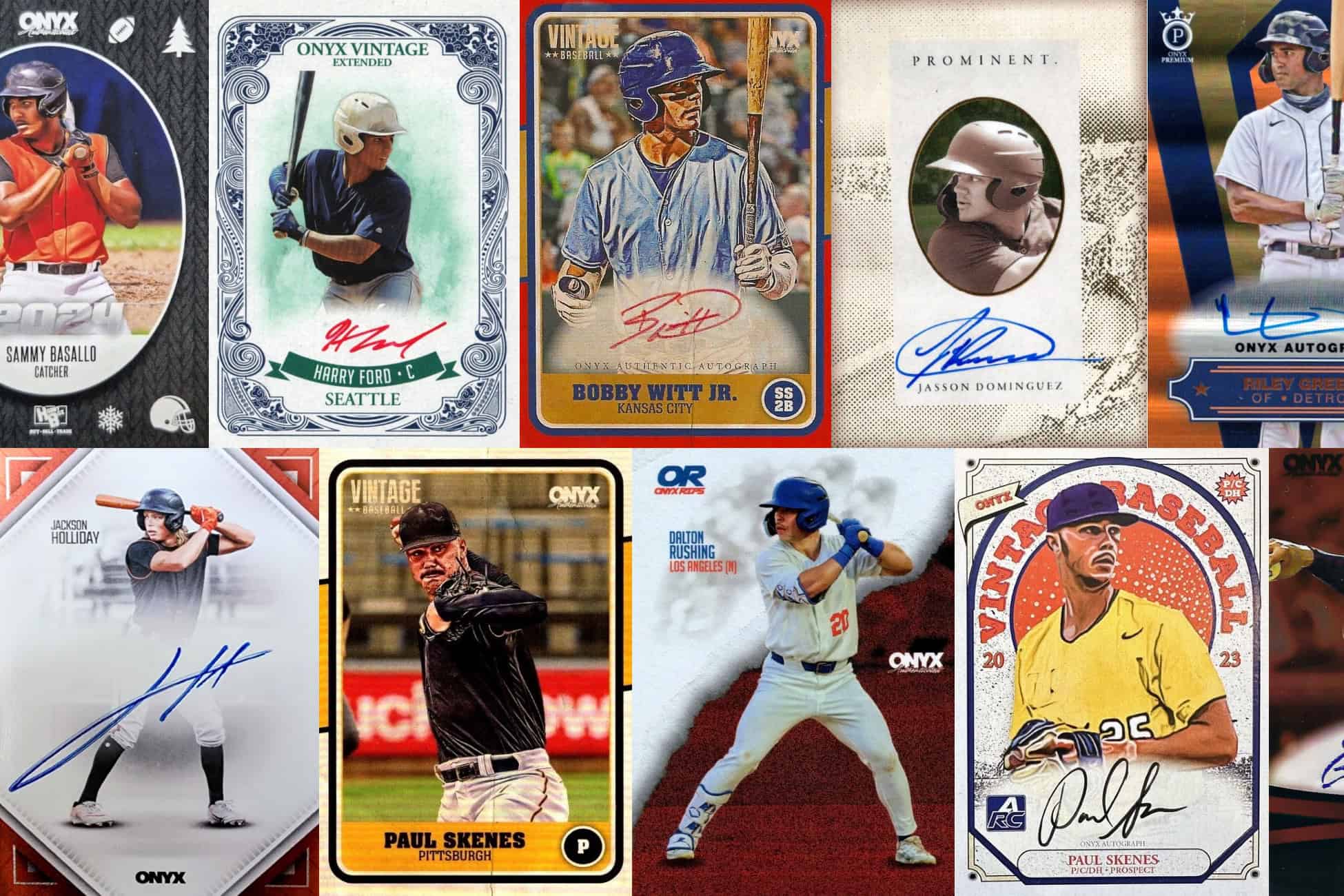Baseball card collectors often focus on the big-name manufacturers. Topps and Bowman dominate because they hold the official Major League Baseball license, giving them exclusive rights to feature team logos and authentic uniforms. Panini also produces baseball cards, but without the license, their products look different. Beyond those companies, a handful of independent producers create their own space in the hobby, often experimenting with design and focusing on areas overlooked by the giants. Among these, Onyx Authenticated has emerged as one of the most respected and innovative.
Onyx cards stand out for their emphasis on prospects, their dedication to authenticity, and their distinctive design philosophy. While Onyx cannot use MLB logos, the company has turned this into a creative advantage, building products that highlight autographs, rarity, and simplicity. Collectors who enjoy scouting future stars or who want something different from mainstream releases often gravitate toward Onyx.
This article explores the history of Onyx, the types of baseball cards they produce, the impact of their unlicensed status, how they compare to other companies, and what makes their designs unique. Along the way, we will examine specific sets and examples of players who first appeared in Onyx before reaching stardom.
History of Onyx
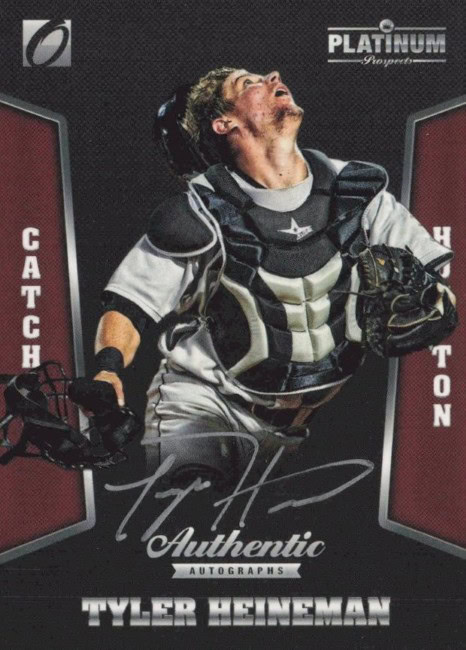
Onyx Authenticated was founded in 2010 by Lance Fischer, a hobby enthusiast who saw an opportunity to combine memorabilia authentication with card production. The company began as a small memorabilia outfit, providing signed bats, jerseys, and balls with certificates of authenticity. Fischer’s vision was to offer collectors assurance that the signatures they were buying were genuine, addressing a long-standing concern in the hobby.
By 2011, Onyx expanded into baseball cards. This was a bold move, considering Topps’ exclusive MLB license and Panini’s established brand presence in other sports. Onyx did not try to compete on the same scale. Instead, it positioned itself as a boutique card maker. The company focused on producing prospect-heavy sets with autographs, often working directly with young players before they reached the majors. This strategy resonated with collectors who wanted early access to potential stars.
Over the years, Onyx has earned credibility for spotting talent early. Cards of players like Ronald Acuña Jr., Gleyber Torres, Rafael Devers, Wander Franco, and Julio Rodríguez appeared in Onyx products before they gained mainstream recognition. That track record has cemented Onyx’s reputation as a company with a keen eye for the future.
Types of Baseball Cards Produced by Onyx
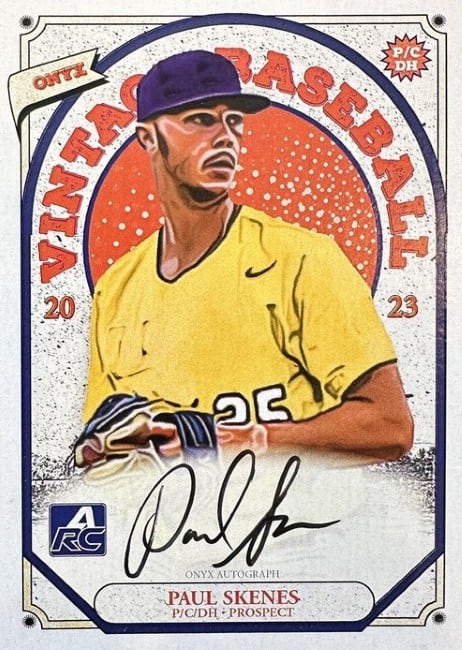
Onyx has never tried to mimic the sprawling checklists of Topps flagship sets. Instead, its offerings are specialized, with smaller checklists, limited runs, and a heavy emphasis on autographs. The company has developed several recurring product lines, each with its own character.
Onyx Vintage
Perhaps the most well-known Onyx product, Vintage cards feature a design inspired by the 1960s and 1970s. Simple borders, retro typography, and clean layouts give the cards an old-school feel. Sets like Onyx Vintage 2019 and 2020 gained attention for including autographs of Wander Franco and Julio Rodríguez before either appeared in Bowman Chrome. Collectors value these early appearances, especially since the cards are low-numbered and autographed on-card.
Onyx Premium
Premium is a higher-end line, with thicker card stock and a more modern design aesthetic. These sets are designed to appeal to collectors who want quality materials and low print runs. Premium boxes usually contain fewer cards but offer strong odds of autographs or parallels. Notably, Onyx Premium featured Shohei Ohtani autographs in its early runs, making it one of the few non-Topps products to include his signature during his rise to stardom.
Onyx Nimbus
Nimbus is one of Onyx’s most creative ventures. Produced in partnership with athletes and celebrities, Nimbus cards often feature limited, artist-driven designs. The sets are intentionally small and sometimes sold directly through Onyx’s website in very limited quantities. Nimbus cards are often numbered to extremely low runs, which adds to their collectibility.
Onyx Clubhouse Collection and Elite
Other lines such as Clubhouse Collection and Elite focus on prospect autographs and memorabilia. Clubhouse Collection cards may include game-used materials like jerseys or bats, while Elite offers a slightly broader checklist but still maintains the boutique feel.
In general, Onyx sets are united by their scarcity and emphasis on autographs. Boxes usually contain only a handful of cards, but the chance of pulling a meaningful autograph is higher compared to mass-market products.
MLB License Challenges
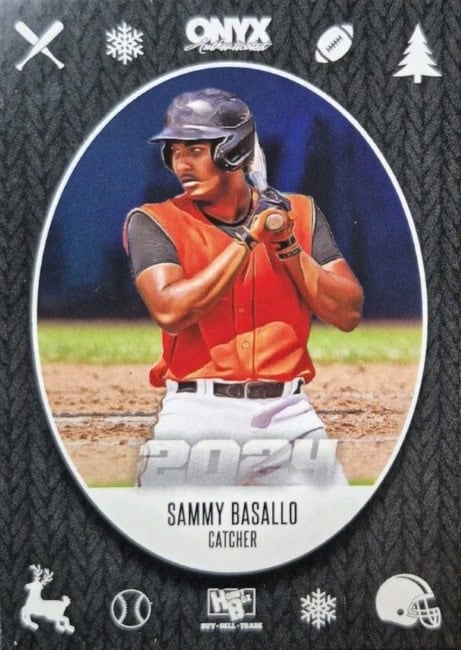
Unlike Topps, which has the official MLB license, Onyx does not have the right to use team logos or uniforms. This puts them in the same category as Panini’s baseball releases. At first glance, this seems like a disadvantage. Many collectors prefer seeing players in full uniform with recognizable team insignias, and licensed rookie cards often carry more long-term value.
However, Onyx has managed to turn this limitation into an advantage. Without licensing restrictions, they have greater flexibility in design. They can create clean, minimalist looks without worrying about fitting in logos and trademarks. More importantly, they avoid paying the high fees associated with licensing, allowing them to invest in higher-quality production methods and hard-signed autographs.
The direct agreements Onyx makes with players also open unique opportunities. They can sign deals with prospects before those players sign with larger card companies, giving Onyx a chance to feature early autographs. This has led to situations where an Onyx autograph is a player’s first professional signature in a card product, a huge draw for prospectors.
Collectors have learned that the lack of logos does not erase value. In fact, when a player becomes a superstar, early Onyx autographs can command strong prices because they are among the earliest and scarcest cards available.
How Onyx Compares to Other Companies
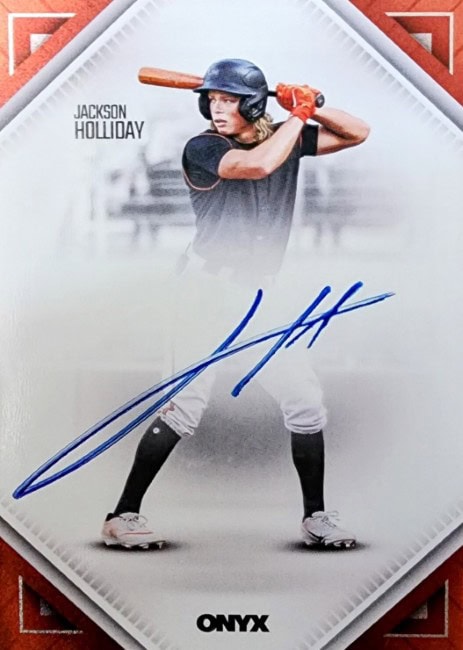
To understand Onyx’s place in the hobby, it helps to compare them with both licensed and unlicensed competitors.
Topps and Bowman remain the gold standard because of their MLB license. Collectors want rookie cards with team logos, and Topps has a monopoly on that. Bowman Chrome, in particular, dominates the prospect market. Onyx cannot replace those products in terms of mainstream desirability.
Panini, while unlicensed in baseball, operates at a much larger scale than Onyx. Sets like Panini Prizm and Donruss include hundreds of cards with parallels, inserts, and retail distribution in big-box stores. Onyx does not compete in mass retail. Instead, it focuses on hobby shops, online sales, and boutique distribution.
Where Onyx stands out is in three areas:
- Hard-signed autographs instead of stickers
- Extremely limited print runs
- Early prospect coverage
These distinctions make Onyx attractive to a subset of collectors who value quality and rarity over mass appeal.
What Makes Onyx Designs Unique
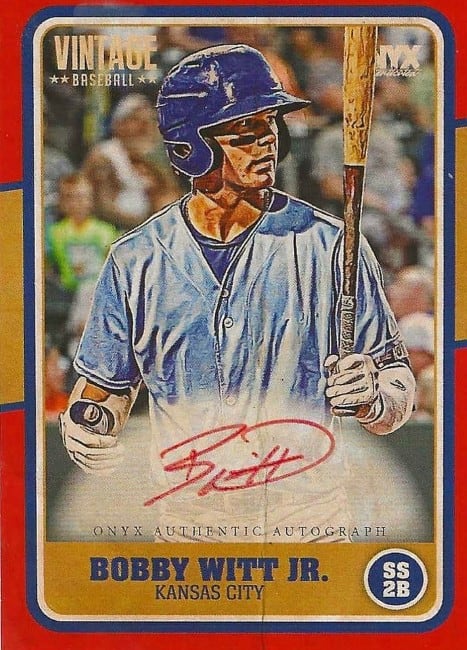
Onyx has developed a consistent design philosophy that separates it from both Topps and Panini. Their designs are clean and often minimalist. Many collectors compare Onyx cards to art prints rather than traditional trading cards. Photography is typically simple, with an emphasis on showcasing the autograph rather than background graphics. Cards with a limited print run also stand out because, rather than featuring a stamped serial number, the print run is printed directly on the card.
The Vintage line is particularly beloved for its old-school aesthetic. By echoing designs from the 1960s and 1970s, Onyx connects collectors with the history of the hobby. At the same time, the cards highlight future stars, creating a contrast between past and future.
The Nimbus line demonstrates Onyx’s willingness to experiment. Collaborations with artists and athletes allow for unconventional designs, some of which look more like modern art than sports cards. This creative approach gives collectors something different from the uniform look of licensed products.
Collector Perceptions of Onyx
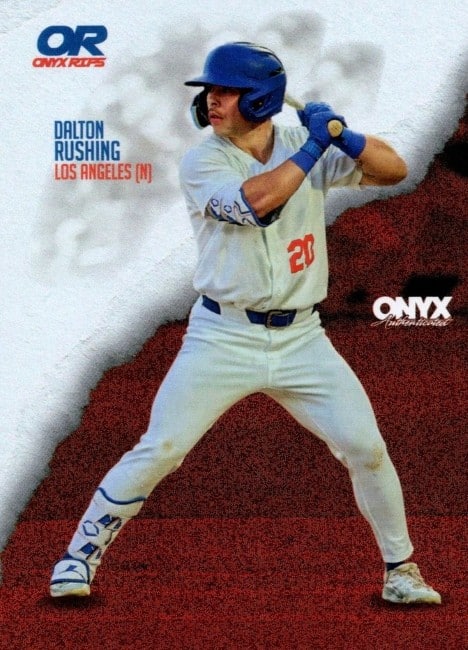
Collector opinions on Onyx vary, but the brand has earned respect in several key areas. Prospectors love the company for its ability to feature players early. Autograph hunters appreciate the emphasis on hard-signed cards. Design-focused collectors value the retro and minimalist styles.
There is, however, a consistent hesitation among collectors who prefer licensed products. Some see Onyx as a supplement rather than a replacement. This perception is unlikely to change as long as Topps holds the MLB license, but it does not diminish the unique value Onyx offers.
Importantly, Onyx has avoided the overproduction problem that plagued other companies in the 1980s and 1990s. Their limited print runs keep supply tight and ensure that cards retain a degree of scarcity.
The Role of Onyx in the Modern Hobby
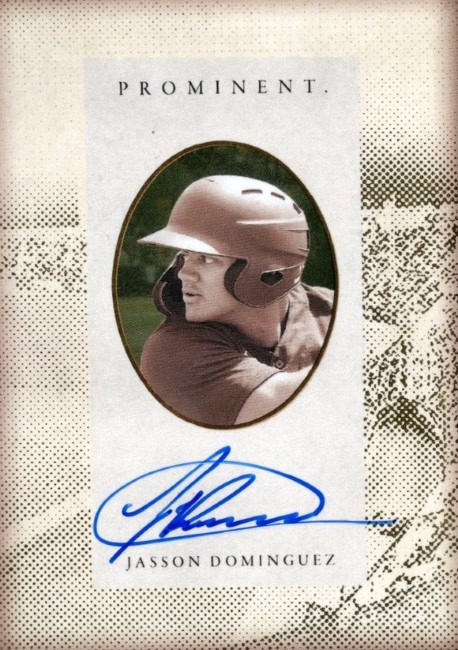
In today’s baseball card market, Onyx serves as both a boutique brand and a proving ground for new ideas. Their products demonstrate that a company does not need official logos to produce desirable cards. By focusing on authenticity, scarcity, and design, Onyx adds diversity to the collecting landscape.
Onyx also gives collectors an opportunity to speculate on players before they appear in licensed products. This makes Onyx cards particularly appealing to prospectors who enjoy the risk-and-reward dynamic of investing in young talent.
In many ways, Onyx plays a role similar to craft breweries in the beer industry. They may not compete with the big brands in volume, but they provide unique flavors that appeal to enthusiasts who want something special.
Conclusion
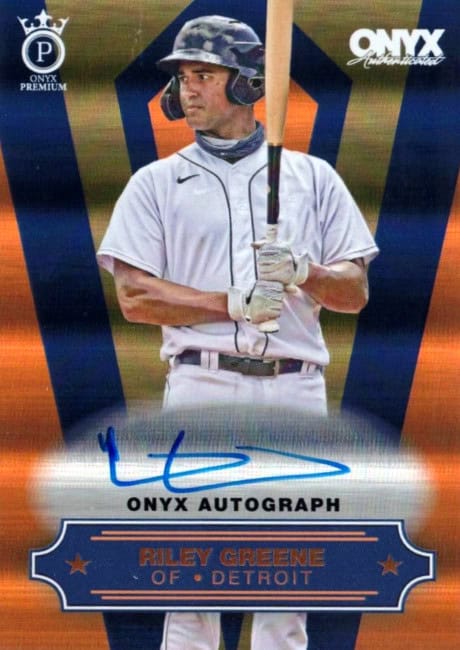
The future looks promising for Onyx. As the hobby continues to grow, more collectors are exploring alternatives beyond Topps. Prospecting remains one of the most exciting parts of collecting, and Onyx is well-positioned to continue serving that demand.
Onyx baseball cards may lack MLB logos, but they more than make up for it with creativity, scarcity, and a strong track record of identifying talent early. Since 2011, Onyx has provided collectors with alternatives to mainstream products, focusing on autographs, prospects, and distinctive designs. Sets like Vintage, Premium, and Nimbus highlight the company’s versatility and commitment to quality.
For collectors, Onyx offers a chance to discover the stars of tomorrow before the rest of the hobby catches on. Their emphasis on hard-signed autographs and limited print runs ensures lasting appeal, while their unique designs stand out in a market often dominated by uniformity. Onyx may not compete with Topps in scale, but it continues to enrich the collecting experience by offering something different and valuable.
